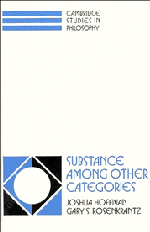Book contents
- Frontmatter
- Contents
- Acknowledgments
- Introduction
- 1 Substance and other categories
- 2 Historically prominent accounts of substance
- 3 Collectionist theories of substance
- 4 The independence criterion of substance
- 5 Souls and bodies
- Appendix 1 The concrete–abstract distinction
- Appendix 2 Continuous space and time and their parts: A defense of an Aristotelean account
- Index
4 - The independence criterion of substance
Published online by Cambridge University Press: 18 September 2009
- Frontmatter
- Contents
- Acknowledgments
- Introduction
- 1 Substance and other categories
- 2 Historically prominent accounts of substance
- 3 Collectionist theories of substance
- 4 The independence criterion of substance
- 5 Souls and bodies
- Appendix 1 The concrete–abstract distinction
- Appendix 2 Continuous space and time and their parts: A defense of an Aristotelean account
- Index
Summary
A Being of itself and independent from any other.
Bp. Pearson Exposition of the Creed I. 31 ([1659] 1682)A substance is a being which can subsist by itself, without dependence upon any other created being.
I. Watts Logick: Or the Right Use of Reason in the Enquiry After Truth I. ii. § 2 (1725)PROBLEMS FOR THE INDEPENDENCE CRITERION
The chain of dependence which runs throughout creation.
J. Tyndall The Glaciers of the Alps I. xxvii. 199 (1860)The substance is not enough, unless it be clothed with its circumstances.
Gracian's (B.) Courtiers Oracle, or the Art of Prudence ii (1685 trans.)According to a traditional view, an individual substance is that which could exist all by itself or which in some sense is “independent”. In this chapter, we construct a new version of an analysis of the ordinary notion of substance in terms of independence, and argue for its adequacy.
Our project is to construct an adequate philosophical analysis of this ordinary notion of thinghood. In setting forth our analysis we shall rely on our earlier arguments that a thing in this ordinary sense, that is, an individual substance, is not reducible to or identifiable with an entity of another kind or ontological category, for example, a set or collection of either properties, ideas, sense-data, or events. (This does not rule out the possibility that substances can be eliminated in favor of entities of another kind or ontological category.)
- Type
- Chapter
- Information
- Substance among Other Categories , pp. 89 - 143Publisher: Cambridge University PressPrint publication year: 1994

